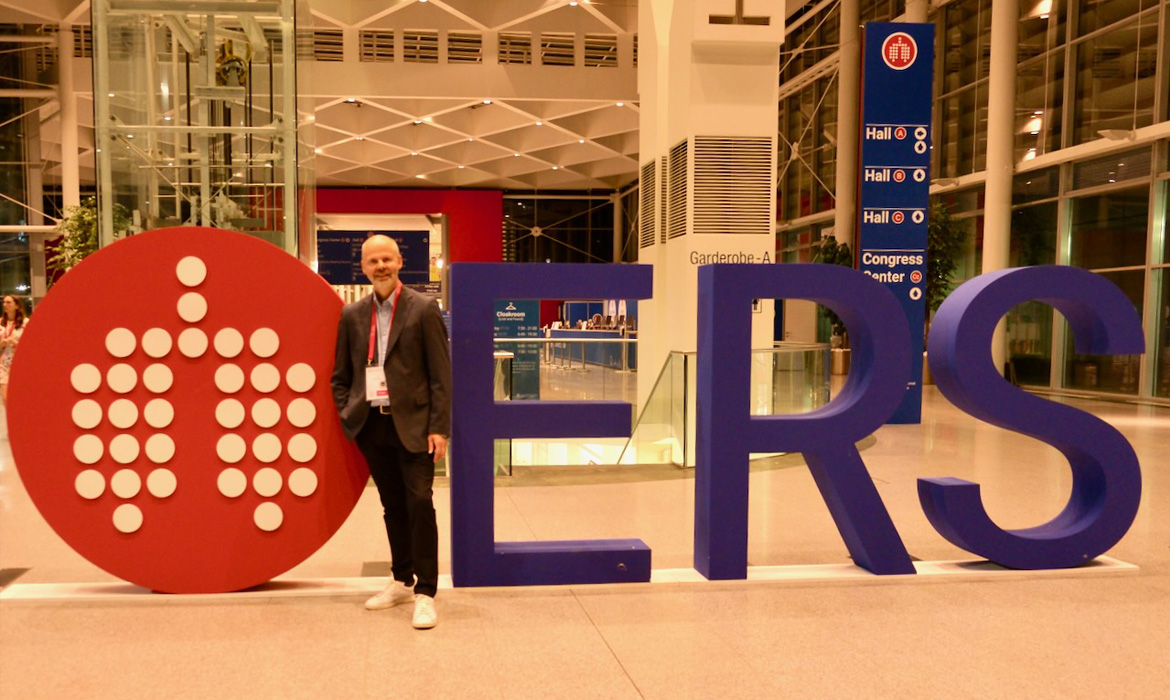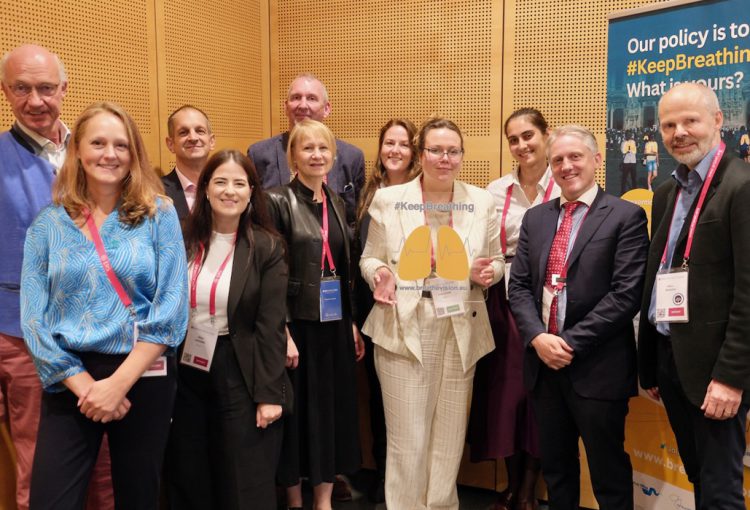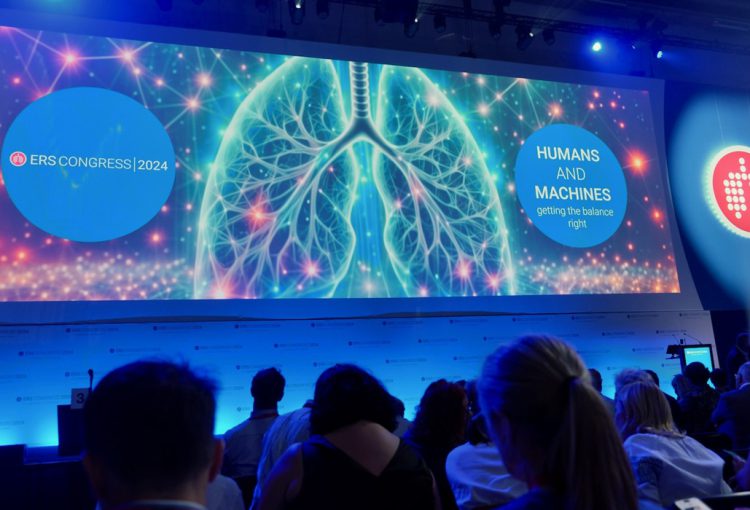My Participation in the ERS Congress 2024

The ERS Congress 2024 in Vienna attracted close to 20,000 delegates, both onsite and online, making it a vibrant and dynamic event focused on advancing respiratory health. The congress provided an excellent platform for networking, knowledge exchange, and collaborative discussions. Here’s a summary of my participation and key highlights from the event.
ELF Networking Day
For a detailed account of the ELF Networking Day, including key discussions and outcomes, please refer to the separate article I have written specifically covering this event.
ERS Opening Session
The congress officially began with an inspiring opening session led by Congress Chairs, Prof. Dr. Judith Löffler-Ragg and Prof. Gabor Kovacs, both renowned experts in pulmonary hypertension. The session was centered around the theme, ‘Humans and Machines: Getting the Balance Right,’ emphasizing the crucial integration of technology in healthcare while maintaining a human-centric approach.
A key highlight was the keynote presentation by Dr. Bertalan Mesko, PhD, known as The Medical Futurist. Dr. Mesko spoke on the transformative impact of artificial intelligence and digital health technologies in shaping the future of healthcare. His presentation focused on pioneering medical futures studies as a scientific discipline, making these methods accessible in healthcare to prepare for a rapidly evolving medical landscape.
Awards Recognition
The opening session also featured the presentation of a couple of prestigious awards, which were especially meaningful to me and the rest of the pulmonary hypertension (PH) community, as both recipients are well-known figures within our field:
– Prof. Dr. Walter Klepetko was granted the ELF Award 2024 for his outstanding work and dedication to providing equal access to lung transplantation for patients in countries without transplantation programs. Prof. Klepetko has built one of the most successful and respected lung transplantation programs at the Medical University of Vienna, which has grown to become Europe’s largest center for teaching and education in this field.
– Prof. Marc Humbert received the ERS Congress Chair Award. Prof. Humbert is a past president of ERS and currently serves as the Dean of Medicine and Professor of Respiratory Medicine at the University Paris-Saclay in France. He has been honored with numerous awards throughout his career and has made significant contributions as the Chief Editor of the European Respiratory Journal from 2013 to 2017, and currently as the Section Editor in charge of Pulmonary Vascular Medicine.
Gossamer Bio Event
During the congress, I attended an external event hosted by Gossamer Bio, where Wendy Gin-Sing presented the Phase 2 seralutinib TORREY study and the Open Label Extension. Wendy delivered a clear and understandable presentation about the study’s progress and outcomes. Additionally, Rainer Zimmermann and Christine Baum presented the ongoing PROSERA phase three study, providing updates on its current status and future directions.
Following these presentations, we ran a workshop to address the challenges of clinical trials, specifically focusing on understanding and overcoming the difficulties in patient recruitment. The workshop aimed to explore the reasons why patients might hesitate to participate in studies and to develop potential remedies to improve engagement and enrollment in clinical trials. The participants represented organisations from around the world including Chile and Brazil in addition to multiple European association leaders attending.
ELF PAC
The ELF Patient Advisory Committee (PAC) is an initiative within the European Lung Foundation that brings together patients, caregivers, and advocates to provide valuable insights and perspectives on respiratory health issues. It aims to ensure that patient voices are included in the development of research, guidelines, and healthcare policies. At the ERS Congress 2024, we had several discussions that underscored the importance of patient involvement.
One of the key moments was meeting Semantha Pegoraro from the World Health Organization (WHO). This interaction provided the PAC delegates with a valuable opportunity to communicate directly with someone working on the global stage, particularly on issues related to air pollution—a major concern for respiratory health worldwide.
Additionally, it was a pleasant change for us as PAC members to meet face-to-face, as our usual interactions are limited to online meetings. This in-person engagement allowed us to strengthen our connections and work more collaboratively on our shared goals.
ELF IPAC
The ELF International Patient Advisory Committee (IPAC) session was led by Liam Galvin, the Chief Executive Officer of the European Pulmonary Fibrosis Federation (EU-PFF) and the newly elected leader of ELF PAC. During this session, we delved into the potential of digital health, guided by Polina Starchenko, with discussions focusing on the promising aspects of AI and digital health technologies. However, there were also concerns about the risk of a digital divide that might prevent some patients from accessing these advancements.
A significant point of discussion was the ongoing collaboration with WHO on an air quality project, emphasizing the need for a global approach to tackle respiratory health challenges related to environmental factors. The session also touched upon access restrictions for patients, particularly the distinction between patients and patient representatives. Even though I am a patient, I also represent the patients in my association, and it is crucial for me to have access to speak with pharmaceutical companies and other stakeholders. This access is necessary not only to provide input and feedback to these companies but also to gain knowledge that I can bring back to the patient community.
ELHG
The European Lung Health Group (ELHG) is an advocacy and action-oriented group that focuses on promoting lung health and driving policy changes at the European level. It includes various stakeholders, such as patients, healthcare professionals, and policymakers, working together to advance the lung health agenda in Europe.
During the ELHG meeting, several key points were discussed:
– The group reviewed the achievements of the #KeepBreathing campaign, which has garnered 509 followers, over 43,000 impressions, and attracted 7,000+ web views and 4,000 web users. This campaign has been pivotal in raising awareness about lung health issues across Europe.
– A major focus was on the need to recruit new Members of the European Parliament (MEPs) to the MEP Lung Health Group. To support this effort, the group is planning a trip to Strasbourg where we will conduct lung function tests at the parliament. This initiative aims not only to highlight the importance of lung health but also to engage directly with MEPs and encourage them to join the MEP Lung Health Group, thereby strengthening political support for lung health initiatives at the EU level.
– Additionally, the group summarized the year’s activities, with a particular highlight being the high-level forum titled #KeepBreathing: A Vision for EU Action on Lung Health 2024-2029, held in Brussels in March. This forum was instrumental in setting the direction for future advocacy efforts and underscored the importance of continued action to influence EU policy on lung health.
ELF PH PAG
The ELF Pulmonary Hypertension Patient Advisory Group (PH PAG) is dedicated to representing the interests of patients with pulmonary hypertension and providing insights that inform research, clinical guidelines, and healthcare policy.
During the ELF PH PAG meeting at the ERS Congress 2024, several important updates and discussions took place:
– Survey Results Presentation: Dr. Joe Newman presented findings from a global online survey conducted by the Pulmonary Vascular Research Institute (PVRI). The survey, which was launched in October of the previous year, gathered responses from 3,770 participants across six continents, 88 countries, and in 24 languages. Dr. Newman also presented a poster on these findings earlier that morning. Notable results included that 57% of adults were diagnosed within 12 months of symptom onset, 34% of adults with idiopathic or heritable pulmonary arterial hypertension (IPAH/HPAH) had undergone genetic testing, and 47% reported experiencing side effects from PH medications in the past six months.
– Employment Impact and Clinical Trial Participation: The survey also highlighted that 74% of adult PH patients reported a negative impact on their employment due to their condition. Despite this, participation in clinical trials remains low, with only 19% having taken part. However, of those who had not participated, 72% expressed a willingness to do so, indicating a significant opportunity for increased engagement in research.
– Expansion of PH Representation: The group discussed the possibility of expanding PH PAG with more representatives from Eastern Europe, aiming to broaden the group’s reach and enhance the diversity of patient perspectives.
ERS CRC PHAROS
The ERS CRC PHAROS meeting focused on establishing a platform for clinical research in pulmonary hypertension (PH), in collaboration with the ERN-Lung network. Key objectives discussed included:
– Workpackage 2: Evaluating patient access to care across Europe by compiling an inventory of centers of expertise, assessing access to advanced therapies such as prostanoids and lung transplantation, and examining the use of Patient-Reported Outcomes Measures (PROMs).
– Workpackage 3 and 4: Characterizing PH patients with failing right ventricles and phenotyping and treating patients with PH due to lung diseases (Group 3 PH), focusing on prospective data collection.
ERN-Lung
ERN-Lung is a European Reference Network that aims to improve the care and treatment of patients with rare or complex respiratory diseases by connecting centers of expertise, healthcare providers, and laboratories across Europe.
During the ERN-Lung session at the congress, Vice-Coordinator Prof. Marc Humbert outlined the network’s ongoing collaborations with ERS, including joint efforts on guidelines, the ERS/ERN-Lung virtual school, and the ERN-Lung academy. The network is focused on improving access to quality diagnosis, care, and treatment by facilitating knowledge exchange, medical research, training, and resources. The meeting also highlighted the upcoming annual board meeting in Paris on March 24-25, and plans to expand ERN-Lung’s reach by supporting applications from new centers, particularly from Eastern European countries.
ERS Sessions
Due to my busy schedule with meetings, I had limited opportunities to attend live sessions. However, all sessions are available online with ERS membership, and I have taken the time to study several of them. Even though many sessions are primarily geared towards healthcare professionals, I gained much valuable insights.
A prominent topic across the sessions was the newest drug on the market, Sotatercept, which was recently approved by the FDA in the US and is now also approved in Europe by the EMA. Dr. Paul Yu, one of the pioneers in the discovery of the Sotatercept molecule, emphasized that this is just the beginning of a new era, with much more research and product development expected in the activin pathway space.
Another session of particular interest was presented by Dr. Athënaïs Boucly on plasma proteome clusters in PH. She discussed the traditional clinical classification of five PH groups but introduced an innovative approach involving the analysis of 156 proteins that are up or downregulated in PH patients. This analysis defined four distinct clusters, with patients from all five PH groups represented in each cluster. These clusters followed their own survival curves, and it was discovered that patients could transition from one cluster to another over time. Dr. Boucly noted that patients in cluster three had an upregulated PDGF pathway, while those in cluster one had an upregulated TGF-beta pathway. This finding suggests that patients from these clusters may respond differently to emerging PH therapies, hinting at the potential for personalized medication, which is expected to be the next trend in PH treatment.
Conclusion
The ERS Congress 2024 was an invaluable experience, filled with opportunities to learn, network, and contribute to discussions shaping the future of respiratory health. From engaging with key stakeholders and exploring the latest research developments to advocating for patient representation and personalized medicine, the congress reaffirmed the importance of collaboration and innovation in improving care for individuals with respiratory conditions.
Hall Skaara
Project Manager
September 15th, 2024




